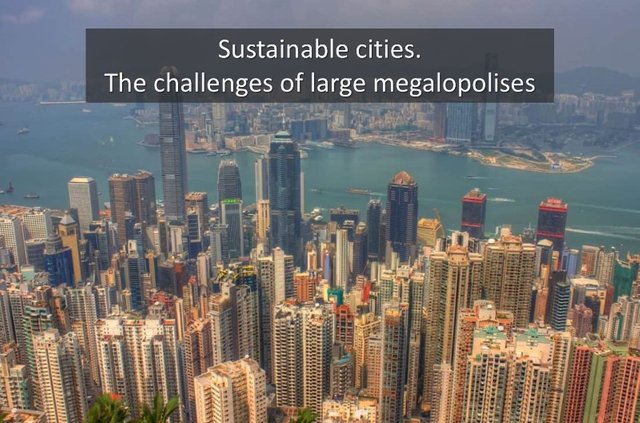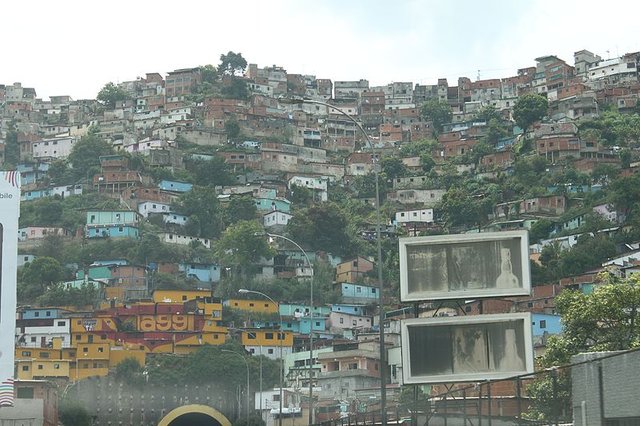Sustainable cities. The challenges of large megalopolises
As we know, cities do not stop growing, due to the increase in population and a sustained migration that is growing every day, which we notice especially in developing countries, which will undoubtedly lead to a greater expansion of cities in the following decades in those territories.

Source: edited image, original from pixnio.com.
There are currently more than 7 billion inhabitants in the world, and it is estimated that by 2030, 60% of that population will be concentrated in urban areas. If we do a quick search of the most populated cities in the world, we can see that there are currently 30 cities whose population exceeds 10 million inhabitants, which is three times more than 20 years ago, and the rate of population growth in these cities, known as megacities, is particularly high, This puts a lot of pressure on the economic system of these cities, which must activate all their engines and boost infrastructure development, so that while these cities are growing, the challenges are also greater, especially in terms of quality of life, so that sustainable growth will be their only chance of survival.
That is why among the Sustainable Development Goals included in the UN Agenda 2030, it was included as goal number 11 to achieve sustainable cities, and within this goal are included to meet needs such as: greater inclusion, safety, resilience and sustainability, among others.
Main challenges
Clean air
Perhaps the main characteristic of the world's large cities is poor air quality. According to the UN, 90% of the inhabitants of large cities do not enjoy good quality air that meets the safety standards established by the World Health Organization. According to WHO figures, 9 out of 10 people in the world breathe polluted air, resulting in nearly 7 million deaths a year. Not only that, different studies have linked air pollution not only to respiratory and cardiac problems, but also to visual impairment and cognitive problems.

ensuring air quality is essential for the citizens of cities. Source: Wikimedia commos.
Although more and more countries are taking measures, there are still many of these megacities around the world that more than quintuplicate the levels set in the WHO guidelines on air quality, which represents a considerable risk to people's health. Therefore, one of the great challenges for these cities will be to provide clean air to their citizens.
Energy consumption
Although these large cities occupy relatively small territories, only 3% of the planet's surface, they represent an important part of energy consumption, between 60% and 80% of energy consumption. So meeting energy needs without adding more carbon to the atmosphere is a challenge.
But there are many emerging technologies that could provide an answer to this situation, and large cities around the world have already taken a step forward to ensure the decarbonization of the electricity system in the coming decades, but there are still many cities to join the use of green technologies and thus contribute to urban air quality.

Producing energy in a sustainable way is a priority. Source: pxhere.com.
Security and inclusivity
For the UN, the accelerated population growth in developing countries and some specific territories is a concern, as it has led to the fact that, in the absence of solutions, a significant part of the population has settled in slums that lack adequate water management and other services, and have become vulnerable to natural disasters.

Planned and balanced population growth must be ensured. Source: wikimedia.commons.
Therefore, efforts must be redoubled for a planned growth of urbanism, with access to safe spaces, effective public transportation, and efficient water and energy supply. Betting on the inclusion and safety of citizens is a guarantee of the future for a significant part of the world's population.
As we can see, improving the local environment of cities is a challenge but also a necessity, which is why we must strive for balanced population growth, guaranteeing social and economic development, in order to create megacities with the least possible environmental burden.
Thanks for coming by to read friends, I hope you liked the information. See you next time.

Hello @emiliomoron
It is a reality, the increasing amount of population is something impressive, and it has a consequence in many aspects.
In the case of pollution it is worrying, especially in big cities, there seems to be no solution coming soon.
The fact that there is no control on the spaces that can and cannot be inhabited, leads to a lack of control in the construction of houses where it can not be. And at the same time it generates more delinquency, the absence of adequate public services, among many other things.
That's right my friend, this is a reality, even for not so big cities, but it is inevitable that they grow in size and population, so these factors must be controlled to ensure the quality of life of its citizens, but those problems you mention will only get worse as the population increases.
Creating sustainable cities would mean losing certain benefits for which humanity is not prepared. Man has been in charge of creating and creating and in my opinion there is no turning back. Resetting the planet with us inside doesn't seem possible either.... Good reading!
Greetings friend, definitely reboot the planet is not possible, but if there is much we can do, there are already examples underway, it is a matter of will to go in the right direction.